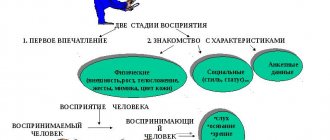Personality qualities are a distinctive set of traits inherent in a person, expressing the uniqueness of states, psychological processes, aspects of character and behavioral patterns in society or the natural environment. The qualities of a person’s personality are always personal. They have quantitative characteristics, as a result of which they are measured by degree, stage of development or level.
A personal set of traits is simultaneously characterized by stability (at the time of measurement) and dynamism, in other words, they remain in constant development (over the years of a person’s existence). Their production and transformation are determined by many conditions of a biological and social nature. Their appearance and further development are significantly influenced by the spirituality of the individual.
Personality diagnostics
To correctly determine the socio-psychological qualities of a person, you need to understand socio-psychological competence. The latter term should be understood as a person’s assessment of psychological phenomena, influence, knowledge acquisition and communications. Competence is usually divided into:
- perceptual,
- interactive,
- communicative.
To diagnose socio-psychological competence in psychology, various methods are used. For example, the KOS-1 methodology was developed to identify the inclinations of an organizer and the ability to establish business and personal contacts in an individual, and subsequently use them to achieve goals.
It is not worth talking about competence without revealing its important part, called psychological observation. The latter is a way of obtaining knowledge through both the prism of personal and social experience
Such observation will become indispensable in the professional sphere of life and will provide an opportunity through knowledge to enrich oneself with certain information about a subject or object that should be used in professional activities.
“Psychological observation will become a necessity for practicing psychologists. After all, it will be with its help that it will be possible to apply complex methods of diagnosing a personality and to compile a psychological portrait of a person.”
Psychological observation includes:
- a cognitive element that is able to select the right way of thinking for a particular situation,
- empathic – necessary for selecting methods for finding mutual understanding between people,
- perceptive – responsible for the internal organization of a person,
- the reflective element helps to understand the meaning of one’s “I” and the interaction of this “I” with others.
Along with competence, which represents the cognitive characteristics of a person, it is customary to distinguish the emotional spectrum, which consists of:
- the simplest emotions that are physiologically determined:
- thirst,
- cold,
- feeling hungry
- drowsiness,
- fatigue and other things;
- momentary emotions:
- horror,
- rage,
- despair;
- emotions by situation:
- delight,
- impatience,
- joy,
- anxiety,
- resentment,
- anxiety;
- psychological state:
- high spirits,
- depressed mood, etc.
An important place in the emotional sphere of the individual is occupied by the so-called “social” emotions. These are serious experiences caused basically by public opinion or the mood of the social group in which the person resides.
Such sentiments are divided into:
- emotional,
- rational,
- conscious,
- unconscious.
However, it is worth noting that social feelings can be caused not only through direct communication in society, but also in connection with isolation. The best way to illustrate this is loneliness, which relates to the mood criteria.
In general, a variety of techniques are used to determine the mood in society. The most common is the “SAN” technique, which allows you to identify the state of a person by marking opposite mood characteristics.
You can also use the expert visual determination technique, based on an opinion about the psychological qualities of a person. In combination with external emotional criteria, it is possible to obtain a holistic picture of a person’s emotional state.
Moral properties of personality
At the genetic level, moral programs inherent in distant ancestors are laid in a person. These properties are adjusted by life under the influence of such factors:
- family education;
- the influence of the school and the yard company;
- social and personal relations;
- life experience.
Each aspect is subject to certain rules of moral behavior. They form the individual’s attitude towards himself and other people. Based on what values were embedded in the inner world, moral qualities are divided into categories: humanistic, nationalistic, racial, religious-fanatical.
Morality is established in childhood
Only the first category refers to positive characteristics. It is based on respect for all people, regardless of their religion, nationality and race.
Basic character traits
Character makes a person unique and helps to stand out from the crowd. Any individual is characterized by the desire to be accepted by society, to become part of a team, family or social group.
Additional Information. Nobody wants to be an outcast. Therefore, the need to be around other people is a natural human need.
To become a part of any society, an individual must not only perform useful functions, but also have a certain character. Knowing which hypothetical traits are welcomed in a group and which are rejected, it will be much easier to build communication with people.
Negative traits
Negative personality traits do not lead an individual to positive results. Negative manifestations of character are condemned in society. Among the main negative character traits, the following options can be distinguished:
- selfishness;
- greed;
- pettiness;
- envy;
- malice;
- deceit;
- self-criticism;
- cowardice;
- laziness;
- stubbornness.
Each of these properties can be diagnosed differently in people. In some people you can find the whole “set” of negative traits, in others you can find several of the most unpleasant “instances”.
How to overcome negative character traits
Important! Some negative qualities can be transformed into positive ones if a person works on himself. Example - a greedy person can become thrifty, a stubborn person can become goal-oriented, a self-critical person can become creative, and a lazy student can become painstaking.
Example: a greedy person can become thrifty, a stubborn person can become goal-oriented, a self-critical person can become creative, and a lazy student can become painstaking.
Positive features
Positive personality traits enable an individual to be useful, reliable, and valuable in society. Each era has its own list of socially significant character traits:
- If ideas focused on individual success are promoted in society, then hard work, initiative, determination, self-sufficiency and independence will be important positive personality traits;
- If collectivism is the main value of society, then individualism will be condemned and rejected in it. Qualities such as loyalty, friendliness, and stress resistance will be represented on the “pedestal.”
Despite this, there is a number of universal human values, among which the following positive features can be distinguished:
- loyalty;
- generosity;
- justice;
- modesty;
- goodwill;
- reliability;
- honesty;
- politeness;
- sense of responsibility;
- determination;
- hard work.
Some positive properties can transform into negative ones. For example, a person cannot always trace the moment when perseverance becomes stubbornness, determination transforms into aggression, and a tolerant individual becomes susceptible to the opinions of others.
Important! To analyze the presence of positive and negative character traits, you need to pay attention to the attitude of others towards the individual.
The attitude of others is the key to self-improvement
Society is a kind of mirror that reflects the real appearance of an individual.
Characteristics of the concept
Personal qualities of a person are a set of human characteristics that are formed under the influence of hereditary or acquired factors. Personality properties can transform and change in the process of life. Qualities as a complex of human characteristics are determined by:
- position in society,
- behavioral characteristics,
- success,
- attitude of others,
- predisposition to specific activities.
There is a point of view that key personality qualities are formed during the first 5 years of life. This process occurs under the influence of genetics and upbringing. Innate, passed on from parents, psychological and emotional tendencies under the influence of external factors (features of the society surrounding the child, parental upbringing, etc.) form the main personal characteristics. Subsequently, they are subject to only adjustments.
A number of psychologists disagree with this interpretation of the formation of personal qualities, since it has been established that personality characteristics in childhood, adolescence, maturity and especially old age can be significantly and radically transformed.
From the point of view of effect, personality traits are divided into two groups:
- Negative. Properties that have a negative impact on a person’s life. They prevent a person from living in society.
- Positive. The characteristics that help a person achieve their goals are recognized in society.
It is worth noting that negative or positive is conditional. It all depends on the specific society where a person lives. Each social group has its own ideas about positive and negative.
Knowledge about the qualitative categories of your personality allows you to increase your awareness and understand your pros and cons. Information makes it possible to guide your development, identify aspects that need to be eliminated or strengthened to achieve life goals.
Knowledge of personality traits helps to competently build relationships with other people. Such opportunities are useful in all areas of life.
Interesting: professional deformation
Types of volitional qualities
The “foundation” is willpower - a special state that can be called a kind of mental habit. It is not always congenital. In most cases, people have to train it: by realizing their desires and aspirations.
To give a more precise definition, it is the ability of an individual to mobilize his body and psyche in such a way as to realize a specific goal. If he does not deviate from the task, does not stop acting halfway to success and does not give up after the first failure, then we can assume that he has no problems with this character trait.
The set of features characterizing this concept includes:
- Independence. This is the ability to work without outside help, as well as the ability to listen critically to advice, analyzing it from the point of view of one’s own beliefs and views. Such a person can organize his own activities. She does not wait for prompts, and also actively defends her own opinion.
- Initiative is the skill to search and find non-standard solutions and ways to implement them.
This also includes willpower - the skill of maintaining the level of effort. In other words, a person maintains strength for a long time. After all, anyone can concentrate for a day, but persistently moving forward for many months is a more difficult problem.
Basic Concepts
This is a set of properties that facilitate the performance of specific tasks. This includes characteristics such as determination, strategy, perseverance, and discipline. They are relatively stable and independent of the situation. With the help of such a set, an individual can consciously regulate his behavior and take power over himself. They are often seen as a personal characteristic of freedom from circumstances, fear or laziness, which so often prevent one from achieving what he wants. I have already briefly outlined the positive aspects. But there are also negative qualities that indicate weakness: shyness and timidity, lack of initiative.
What influences the formation of personality
In an individual, these traits manifest themselves in varying degrees and intensity, which is why all people are different from each other. Imagine that inside each of us there is our own personal mosaic: everyone has it, but no one has one like you.
You will not find two completely identical people on the planet: each has its own peculiarity, individuality. This explains conflicts, contradictions and misunderstandings between individuals.
Capabilities
In everyday life, abilities are certain skills that allow a person to achieve certain results.
Abilities are divided into innate and acquired, and have a whole classification:
- the simplest abilities - the ability to breathe, see, touch, walk. That is, this includes the simplest human actions and the work of the senses;
- difficult ones are those that need to be learned. For example, playing the piano, drawing, embroidery. Acquired abilities are also called socially determined, since a person is not born with them;
- general - present in everyone, but to varying degrees. For example, everyone has the ability to learn, but someone grabs new material on the fly, while others take much more time to learn the same thing;
- special ones - not everyone has them and are based on certain inclinations a person has. For example, Mozart wrote his first symphony at the age of 8, something not every child is capable of. It is precisely such people who often become outstanding personalities;
- theoretical – consist in the ability to pose and solve theoretical problems using abstract logical thinking. To put it simply, solve problems in your head;
- practical – the ability to set practical problems and solve them. This includes developing a plan, breaking it down into large and small actions, and successfully implementing them in life;
- communicative - an example of good abilities of this kind is a person who knows how to establish effective interaction with others: influence people, resolve conflict situations, achieve what they want, win over and find a common language;
- subject-activity - the ability to handle objects.
Temperament
Temperament explains how a person experiences various mental states in connection with different life circumstances. Two people with different temperaments, faced with the same situation, are likely to react differently.
For example, they will both lose a valuable item. One will be upset, a little worried, and the next day he will smile as if nothing had happened. The second one will be so upset that he will fall into a depressive state, from which the best psychologists in the city will then pull him out. The example is exaggerated for a clearer understanding of what temperament is.
In psychology, there are only 4 types of temperament, proposed by the well-known historical figure - Hippocrates:
- – this includes vulnerable, anxious people who do not take criticism well, who give up at the slightest obstacle. They get tired quickly, tend to become despondent and depressed (what is this?).
- the type characterizes hot-tempered, unrestrained, quickly irritated people. Their reactions are impulsive, but despite this, they quickly calm down and continue to behave as if nothing had happened.
- Phlegmatic is a calm, balanced person who prefers a state of inaction and contemplation. He slowly gets irritated, but holds a negative fuse for a long time. It takes a lot of effort to piss him off, but then watch out. The phlegmatic person is conservative, difficult to adapt to new conditions, but at the same time diligent and has a high performance capacity.
- – this type includes cheerful, optimistic, easily adaptable people. These are strong personalities: an example of one of them is the person described above, who lost something valuable, but continues to enjoy life. According to statistics, a sanguine person achieves great success in society, since he sees fewer obstacles in front of him - he simply bypasses them.
Social psychology: lecture notes
LECTURE No. 2. Social and psychological characteristics of personality
Personality
is a conscious and active person who has the opportunity to choose one way of life or another.
It all depends on the personal and psychological qualities that are inherent in the individual; they must be correctly understood and taken into account.
Social and psychological characteristics of personality.
The personality of a person as a member of society is in the sphere of influence of various relationships that develop in the process of production and consumption of material goods.
The process of personality formation occurs both under the influence of the sphere of political relations and ideology.
Ideology as a system of ideas about society has a huge impact on a person, largely shaping the content of his psychology, worldview, individual and social attitudes.
The psychology of an individual is also influenced by the relationships of people in the social group to which she belongs.
In the process of interaction and communication, individuals mutually influence each other, as a result of which a commonality in views, social attitudes and other types of attitudes towards society, work, people, and one’s own qualities is formed.
In a group, a person gains a certain authority, occupies a certain position, and plays certain roles.
A personality is not only an object of social relations, but also their subject, i.e. an active link.
A personality is a specific person who is a representative of a certain state, society and group (social, ethnic, religious, political, gender, age, etc.), aware of his relationship to the people around him and social reality, included in all relations of the latter, engaged in a unique type of activity and endowed with specific individual and socio-psychological characteristics.
Personal development is determined by various factors: the unique physiology of higher nervous activity, anatomical and physiological characteristics, the environment and society, and the field of activity.
The peculiarity of the physiology of higher nervous activity of the individual
- this is the specificity of the functioning of its nervous system, expressed in various characteristics: the relationship between the processes of excitation and inhibition in the cerebral cortex, the manifestation of temperament, emotions and feelings in behavior, etc.
Anatomical and physiological characteristics of personality
- characteristics that depend on the anatomical and physiological structure of the human body, which has a serious impact on both his psyche and behavior, and on the latter’s susceptibility to the actions of circumstances and other people.
The most important factors in the formation of personality are the natural and geographical environment
and
society
.
Macro environment
- society in the totality of all its manifestations.
The microenvironment
- group, microgroup, family, and so on - is also an important determinant of personality formation.
The microenvironment lays down the most important moral and moral-psychological characteristics of a person, which must be taken into account, as well as improved or transformed in the process of training and education.
Socially useful activities
- this is work in which a person develops and his most important qualities are formed.
The socio-psychological characteristics of a personality as a description of the entire complex of characteristic features inherent in it have an internal structure that includes certain aspects.
Psychological side
personality reflects the specifics of the functioning of its mental processes, properties, states.
Mental processes
are mental phenomena that provide the primary reflection and awareness by the individual of the influences of the surrounding reality.
Mental properties are the most stable and constantly manifested personality traits, providing a certain level of behavior and activity typical for it. Personality properties: orientation, temperament, character and abilities.
Worldview side
reflects its socially significant qualities and features that allow it to occupy a worthy place in society.
Social and psychological side
reflects the basic qualities and characteristics that allow her to play certain roles in society and occupy a certain position among other people.
The idea associated with psychoanalysis about the layered structure of personality has become widespread ( I. Hofman, D. Brown
etc.): the outer layer is ideals, the inner layer is “deep” instinctive drives.
L. Klages
proposed a scheme that included the components of personality and character:
1) matter;
2) structure;
3) driving forces.
American psychologist R. Cattell
indicates three aspects of personality:
1) interests;
2) abilities;
3) temperament.
L. Rubinstein
considers personality in three planes, such as:
1) orientation (attitudes, interests, needs);
2) abilities;
3) temperament and character.
Following J. Mead
interactionists identify three main components in the structure of personality:
I, me, self
. Their interpretation:
1) I
(literally “I”) is the impulsive, active, creative, driving principle of the personality;
2) me
(literally - “me”, i.e. how others should see me) is a reflexive normative “I”, internal social control based on taking into account the expectations of the demands of other people and, above all, the “generalized other”.
The reflexive “I” controls and directs the impulsive “I” in accordance with the learned norms of behavior in order to successfully, from the individual’s point of view, carry out social interaction;
3) self
(“self” of a person, personality, personal “I”) - a combination of impulsive and reflexive “I”, their active interaction.
Interactionists interpret a person as an active creative being, capable of evaluating and constructing his own actions.
Following J. Mead, modern interactionists see in the active creative beginning of the individual the basis for the development of not only the individual himself, but also an explanation of the changes that occur in society.
The reason for changes in society should be sought in the specifics of the personality structure, in the fact that the presence of an impulsive “I” in it is a prerequisite for the emergence of various variations in patterns of role behavior and even deviations from these patterns.
Changes in society are random and do not obey any patterns, and the reason for their occurrence depends on the individual.
When compiling a socio-psychological characteristics of a person, it is necessary to take into account somatophysiological characteristics. The anatomical and physiological specificity of the structure of the human body determines the development of some of its socio-psychological qualities.
There are three socio-psychological types: picnics, athletics and asthenics.
Picnics
are distinguished by a high degree of interpersonal contact and adaptability to the social environment; the desire to build relationships with all other people in a certain way, which allows them to defend their interests and passions without entering into conflicts with others.
Athletics
They are sociable and socially active, strive to be the center of attention and gain dominant positions among other people, and are characterized by ebullient expressiveness.
Asthenics
unsociable, reserved in cooperation with other people, cautious in active relationships in a group, very sensitive to changes in their status or social position, and suffer from claustrophobia.
When composing the socio-psychological characteristics of a person, one should take into account his belonging to a certain type of higher nervous activity: sanguine people, phlegmatic people, choleric people, melancholic people.
Sanguines
are in high spirits, are distinguished by fast and effective thinking, and great productivity.
Phlegmatic people
anxiety is completely alien. Their state is calm, quiet contentment.
Sanguine and phlegmatic people are quite balanced in relationships with other people, rarely engage in interpersonal confrontation, and soberly assess their place.
Actions of choleric people
They are characterized by sharpness, impetuosity, and the instinct of self-preservation is weakened.
Melancholic people
are characterized by tightness in movements, hesitation and caution in decisions.
Cholerics are the most conflict-ridden individuals. Depending on the type of higher nervous activity, people are initially predisposed to the dominance of certain emotions.
The socio-psychological characteristics of a personality are complemented by its extroversion or introversion.
Extraversion
indicates such psychological characteristics of an individual when he focuses his attention on the outside world, sometimes at the expense of his own interests, belittling personal significance.
Introversion
characterized by fixation of the individual’s attention on his inner world. Introverts consider their interests to be the most important.
For any person, from early childhood, the innate dynamic characteristics of the nervous system are associated with dominant instincts.
Instincts
- a program of adaptation, self-preservation and procreation, fixed in the genetic code, attitude towards oneself and others.
The primary difference between people follows from the dominance of instinct.
Types of people according to instinct dominance:
1) egophilic type
— self-preservation dominates;
2) genophilic type
- instinct of procreation;
3) altruistic type
- instinct of altruism;
4) research type
- instinct of exploration;
5) dominant type
- instinct of dominance;
6) libertophilic type
- instinct of freedom;
7) digitophilic type
- instinct to preserve dignity.
Man as an individual is constantly developing and improving.
It is necessary to remember the driving forces, factors, prerequisites and levels of personal development, which, on the one hand, makes it possible to constantly monitor and record them, and on the other hand, to actively influence the process of training and education of a person.
Driving forces of mental development
- these are contradictions: between the needs of the individual and external circumstances; between her increased physical abilities, spiritual needs and old forms of activity; between new activity requirements and unformed skills.
Factors of mental development
- that objectively existing thing that necessarily determines the life activity of an individual in the broadest sense of the word.
Factors in the mental development of a person can be external and internal.
External
factors are the environment and society in which a person develops,
internal factors
are the biogenetic and physiological characteristics of a person and his psyche.
Prerequisites for mental development
- something that has a certain influence on the individual, i.e. external and internal circumstances on which the characteristics and level of his mental development depend.
External
the prerequisites are the quality and characteristics of a person’s upbringing,
the internal ones
are activity and the desire to improve, as well as the motives and goals that guide a person in the interests of his development as an individual.
Levels of mental development
- the degree and indicators of a person’s mental development in the process and at various stages of the formation of his personality.
Level of current personality development
- an indicator characterizing a person’s ability.
It indicates what kind of training, skills and abilities an individual has, what qualities are developed.
Level of proximal personality development
- an indicator of what a person cannot do well, but which he can cope with with a little help.
The completeness of personality content and its main socio-psychological characteristics are determined by:
1) the content and psychological essence of the worldview. A person’s worldview is his established system of beliefs, scientific views on nature, society, human relationships, which have become his internal property and deposited in the form of certain life goals and interests, relationships, positions;
2) the degree of integrity of worldview and beliefs, the absence or presence of contradictions in them, reflecting the opposing interests of different layers of society;
End of introductory fragment.
Strong-willed traits of people
Adjusting behavioral factors associated with overcoming internal and external discomfort makes it possible to determine personal qualities: the level of effort and plans for taking actions, concentration in a given direction. Will manifests itself in the following properties:
- willpower - the level of effort to achieve the desired result;
- perseverance – the ability to mobilize to overcome troubles;
- endurance - the ability to limit feelings, thinking and actions.
Courage, self-control, commitment are the personal qualities of strong-willed people. They are classified into simple and complex acts. In a simple case, incentives to action flow into execution automatically. Complex acts are carried out on the basis of motivation, drawing up a plan and taking into account the consequences.
List of qualities
Personality structure includes temperament, volitional qualities, abilities, character, emotions, social attitudes and motivation. And also separately the following qualities:
- Independence;
- Intellectual self-improvement;
- Communication skills;
- Kindness;
- Hard work;
- Honesty;
- Determination;
- Responsibility;
- Respect;
- Confidence;
- Discipline;
- Humanity;
- Mercy;
- Curiosity;
- Objectivity.
A person’s personal qualities consist of internal perception and external manifestations. External manifestation includes a list of indicators:
- innate or acquired artistry;
- attractive appearance and sense of style;
- oratory skills and clear pronunciation of speech;
- a competent and sophisticated approach to non-verbal communication.
The main qualities of a person (her inner world) can be classified according to a number of characteristics:
- a comprehensive assessment of the situation and the absence of conflicting perceptions of information;
- an inherent love for people;
- open-minded thinking;
- positive form of perception;
- wise judgment.
The level of these indicators determines the individual characteristics of the individual being studied.
Development of personal and professional qualities
It is the qualities of a person as a professional that are the guideline by which a person’s compliance with his position, and in general, his field of activity, is assessed. An adequate perception of oneself in the team and the employees around is also an indicator of success as a professional.
A person who has a certain set of qualities suitable for his chosen profession develops much faster and achieves high goals, is confident in himself, and knows how to act to climb the career ladder.
Each individual profession requires certain professional qualities.
Despite this, there is a list of general criteria that employers pay attention to. Their presence is welcome in almost any field of activity.
Since not only his personal success, but also the development of the entire organization depends on the professionalism of each employee, the employer pays special attention to this factor.
Main professional qualities
The most important qualities are:
- ability to work as a team with a team;
- fast learning and flexibility;
- initiative, but not focusing on oneself;
- ability to complete a task without constant supervision from superiors;
- the ability to defend and argue one’s opinion;
- reaction speed and ability to take responsibility for one’s decisions;
- ability to accurately follow job instructions;
- communication skills and the ability to resolve conflict situations.
Professional qualities, like personal ones, are the result of the educational process. The contribution of parents, the general atmosphere in the family, confidence in a reliable rear as relatives help a person to feel confident, easily set goals and achieve them
The social sphere, the influence of teachers, friends is also important. However, the absence of traits instilled from childhood is not necessarily the final verdict.
A person can always independently develop the necessary professional qualities.
Theories of cognition "I"
With the development of psychological science in the middle of the last century, much attention was paid to theories of cognition, that is, theories of cognitive correspondence. The main thesis of these opinions:
- they have a certain structure,
- their structure is balanced and in balance. Otherwise, the personality involuntarily launches mechanisms designed to restore the disturbed state and internal conformity.
The answer to the question “who am I?” - This is a vivid example that proves the research conducted. To do this, people participating in the experiment are asked to give 20 different answers to it over the course of 12 minutes. Moreover, the answers should correspond to the person, but characterize him from different angles. It is noteworthy that the first results are very illogical, since they were said spontaneously. Subsequent responses are better thought out because they are generated through introspection.
V.V. Stolin defined the psychological qualities of a person from the point of view of understanding the meaning of “I”. To make his theory easier to understand, some categories are highlighted, the main ones being:
- understanding your “I”,
- self-perception,
- self-respect, self-confidence,
- perceived attitude of others.
In order to give a detailed assessment according to the specified criteria, a person is offered a list of questions with ready-made answers of 2 types:
- "I don't agree"
- "agree".
Depending on the results of the experiment, the answer will be given where a person expresses himself more and which area he controls more:
- internal (integral type of localization),
- external (external).
Social and psychological qualities
Every day people have to interact with society, expressing their own communication skills and a complex of socio-psychological personality traits.
The concept of “personality” already presupposes a certain quality, since each subject must independently develop a personality in his own person. No one is born a person right away. This process of formation is influenced by a lot of circumstances and, above all, upbringing, the street environment, and living conditions.
Socio-psychological personal parameters are developed as a result of the influence of interaction with surrounding subjects, the result of which is the emergence of formed beliefs and social demands regarding oneself and society.
Psychological traits and social characteristics are formed subject to the presence of communicative interaction with social subgroups. The social characteristics of a person reflect his fundamental traits, which allow people to occupy certain positions in society.
Social and psychological parameters in the personality structure divide individuals into three types: athletics, picnics and asthenics.
People belonging to the first type have the traits of a socially energetic personality who strives to be in the circle of attention. An athlete wants to gain the trust of others and take a leading position in the social environment. Such personalities are quite expressive.
People of the second variety quickly adapt to new conditions. They build relationships with surrounding individuals in society, based on the ability to freely express their own beliefs, interests, principles, while avoiding conflict situations.
People belonging to the latter variety are characterized by low sociability. They are introverts who do not strive to acquire connections, relationships and new acquaintances.
Social and psychological qualities of a person are determined by:
– the content of a person’s worldview;
– interests and needs, the degree of rapid switching from one to another or their stability, insignificant content of interests and needs, or vice versa;
– the level of integrity of such a worldview and personal attitudes;
– the degree of awareness of one’s own purpose in the social environment;
– an extraordinary manifestation of a complex of various qualities.
Thus, for a prosperous life, a person should invariably develop social traits and psychological qualities in his own personality. Since the level of socio-psychological parameters of the individual has a direct impact on performance.
Moral qualities
Morality is the system of internal values of a person that determine his behavioral response, attitude towards the social environment, close people and himself.
A person’s system of internal norms is developed as a result of the influence of many factors: family relationships, personal experience, school environment, social relationships.
Morality can be racial, humanistic, religious-fanatical, nationalistic, which is determined by the values that were the basis for the formation of a person’s internal rules.
The moral formation of a child’s personality is determined by his perception of moral norms, knowledge of such norms, habits of behavioral reactions, and the internal position of the baby.
For the development of a child as a social creature, knowledge of behavioral norms is of paramount importance. The preschool age of the baby is characterized by the assimilation of social postulates of behavior through interaction with the environment (relatives, peers, teachers).
The assimilation of norms, first of all, involves the child’s gradual understanding and comprehension of their role, as well as the development of behavioral habits through interaction with society. A habit reflects an emotionally felt stimulating force - the child has to act, violating normal behavior, which creates a feeling of discomfort in the baby. In addition, the assimilation of norms presupposes that the child absorbs a certain emotional attitude towards the norms.
Important personality qualities, such as tact, correctness, respect, careful attitude towards heritage, nature - this is the basis on which the successful coexistence of a person in society is built.
Among the primary moral qualities are the following:
– philanthropy (selfless help to people, kindness);
– loyalty (this trait has two directions: towards oneself, that is, following one’s own principles, ideals, and outside, which implies loyalty to the Fatherland);
- respect;
– selflessness (actions without personal gain);
– spirituality (a characteristic that includes moral aspects and religiosity, which exalts the human spirit).
Concept of abilities
Abilities are special personality properties that allow a person to achieve success in a particular type of activity. Abilities are formed on the basis of natural inclinations. Features of the functioning of the brain, the degree of sensitivity of the analyzers are the main inclinations of the development of abilities.
Unique ability
The level of development of a person’s abilities determines the success of a particular activity. In school classes, the teacher divides students into weak and strong based on the level of development of abilities. In a production team, the level of development of abilities determines the speed of advancement up the career ladder. In the sports section, the coach, based on developing the abilities of young athletes, assembles a team to participate in competitions.
Interesting. Having different levels of development of abilities, people use different ways to achieve goals and methods of solving problems. Through abilities, a person can transfer acquired skills from one area of application to another, using proven tools for various practical tasks.
General and special abilities
Psychophysiologists classify abilities into general and special. General abilities are necessary for the successful mastery of skills such as reading, writing, counting, and self-care skills. Special abilities determine a person’s success in creative activities and sports.
Important! The development of special abilities is based on general abilities. Without mastering general academic skills, a child will not be able to succeed in creative activities.
Identify and justify the main groups of personal qualities of a social worker
the social worker’s attitude towards people: tolerance, empathy, mercy, kindness, honesty, tact, goodwill, sensitivity and attentiveness, etc.; the social worker’s attitude towards his professional work (work): initiative, efficiency, responsibility, optimism, willpower, organization, perseverance, emotional stability, etc. The social worker’s attitude towards himself is also essential: self-criticism, reflexivity, self-confidence, social activity, endurance and self-control, desire for self-improvement, etc.
At the same time, researchers identify the following groups of qualities:
— psychological characteristics that are part of the ability for this type of activity;
— psychoanalytic qualities aimed at improving the social worker as a professional;
— psychological and pedagogical qualities aimed at creating the effect of personal charm.
To the first group
qualities include the requirements imposed by professional activity on mental processes: perception, memory, imagination, thinking, mental states - fatigue, apathy, stress, anxiety, depression, attention as a state of consciousness, emotional (restraint, indifference) and volitional (perseverance, consistency, impulsiveness) characteristics. Some of these psychological foundations are the main ones; without them, high-quality professional activity is generally impossible.
To the second group of qualities
include psychoanalytic qualities aimed at improving the social worker as a professional specialist. These are self-control, self-criticism, self-esteem, stress resistance, self-hypnosis, the ability to switch and manage emotions.
To the third group
qualities include: sociability, empathy, visuality, eloquence, etc. This group of qualities is related and based on some psychological theories of communication (self-presentation or self-presentation). Various studies have been devoted to this problem, but a specialist in any area of social interaction must have the ability to present oneself correctly and adequately to the situation.
Improvement
The first stages are formed in childhood. And the education provided by parents plays a huge role in this matter. If they pamper their child, do everything he asks, and try to indulge him in every possible way, then, most likely, he will grow up capricious, in a negative sense, stubborn with passive inclinations. This entails a certain danger, since upon entering adulthood, the individual will expect similar parental behavior from others.
But if mom and dad initially set serious demands on the baby (not to be confused with despotic ones), then from an early age the child will learn to achieve the goals set. And one of the effective ways to do this is to send him to a circle. But it is he who should choose it, since imposing hobbies is fraught with negative consequences in the future
It is important not to completely control the interests of children, but to promote their development
Let's say a boy or girl really likes to draw. This means that such an aspect as passion is already present. But the second factor – patience and discipline – must be created. Therefore, it is worth giving your child drawing tasks, praising the results and providing a reward for achievements.
But you can engage in development as an adult, although this will be much more difficult if the habit of self-discipline is absent. Let's consider one of the methods step by step:
- Select a tool. This implies the area where efforts will be applied: profession, interests and hobbies. The best option is to choose the area where experience is at zero. Then progress will be visible much more clearly.
- Setting goals. At first they should be small. So, for example, a man who comes to the gym for the first time is unlikely to lift a barbell weighing 100 kg. It's the same in programming, writing or painting. If you immediately set global goals for yourself, you can quickly “burn out” without getting the desired result.
- From simple to complex. As soon as you begin to confidently perform the simplest actions, then increase the complexity. Otherwise, there is a risk of remaining at the same level.
- Write it down. Record successes and analyze failures. This will provide additional motivation and prevent further mistakes.
Formation and significance of personal qualities
It is customary to divide all qualities into positive and negative. However, sometimes it is necessary to show the negative sides of character. Let’s say that loyalty to the company’s management will not benefit a subordinate at all if arbitrariness begins against him. In this case, a healthy dose of aggressiveness can help you defend your own opinion, or end an unsatisfactory working relationship.
If you look at the topic of the article from a psychological point of view, then personality traits determine an individual’s properties, temperament, interaction with the environment and himself, and are also an indicator of his knowledge and skills.
Psychology differentiates personality qualities according to various criteria, and also identifies characteristic typologies depending on the totality of these indicators. The desire to put everything “on the shelves” makes it possible to “interpret” a person in literally a couple of hours of communication. Such skills are valued in specialists who are involved in personnel selection, but the ability to determine “who is who” will also be useful for the average person, because such a skill is necessary for self-awareness. By critically assessing your own strengths, it is easier to work on yourself. This means trying to eradicate negative traits by developing positive ones.
According to psychologists, human qualities are divided into innate and acquired. Leadership, kindness, aggressiveness, sociability - all this is already inherent in the human genotype and manifests itself long before school age
Parents need to focus attention on the child’s characteristics in a timely manner and correctly correct them. And all because acquired qualities play no less a role in the development of personality
They are formed in the family and in society.
Ignoring the innate qualities of a son or daughter becomes fertile ground for future psychological problems. Therefore, the ability to identify, encourage and eradicate certain personality traits will be useful to people who strive to improve their own qualities and be in harmony with the world around them.
To summarize, it should be said that the above list of main positive qualities is limited, since it is impossible to expand it within the framework of one article. However, there must be a golden mean in everything. It happens that excessive altruism has a detrimental effect, since sooner or later it leads to consumerism. Being humane, kind and sympathetic is good, but the ability to clearly follow one’s own convictions predetermines scrupulous work on oneself.
There is no doubt that the opinion of experts in assessing qualities is an objective factor. It is much more important to be self-critical of yourself and identify weaknesses and strengths for their further adjustment depending on the situation.
What it is
The personal qualities of people are the so-called personal “attributes” of a person, influencing all possible aspects of his life, from the choice of daily wardrobe to professional preferences. Simply put, these are innate characteristics and acquired character traits. Some personal parameters can be modified due to the influence of society and life circumstances, while others remain constant. There is an opinion among psychologists that most personality traits are formed in the first five years of a baby’s existence; in subsequent years they are only subject to adjustment.
Innate personality traits include various character traits. So, for example, Cattell counts among them intelligence, the peculiarities of the processes of memorization and perception, memory, musical or artistic talent, and the fundamental properties of temperament.
In turn, Jung followed a similar theory and divided people according to their main subtypes into intuitive, feeling, sensing, thinking.
Personal characteristics are especially influential when choosing a professional field. Most psychologists claim that a person who has an unsuitable character for a chosen activity will never be able to achieve success in it.
Moreover, each area of employment is characterized by a separate set of desirable personality qualities and undesirable ones. For example, a successful businessman needs the following “attributes”: hard work, independence, determination, adequate self-esteem, courage, responsibility, initiative, stress resistance and communication skills. In addition, such parameters as uncertainty, aggressiveness and tactlessness should be absent.
The teacher must have observation, an adequate level of exactingness, and tact. He should be balanced and attentive, but at the same time it is better for him not to have a tendency towards aggressive manifestations, not to be withdrawn, irresponsible and unpunctual.
All qualities inherent in a personality and revealed throughout its existence are connected in pairs. They have a positive component and a negative color in accordance with their orientation.
The basic qualities of a person show the specificity of mental phenomena, characteristics and states of a person, express his character traits, aspects of temperament, originality of behavior, originality of interaction with society, the environment, and his own person. Simply put, they show the individual psychological attributes of a person. Also, these qualities include the subject’s skills, knowledge and abilities.
A person who knows what personal qualities there are can identify them in himself in order to chart a course and ways of corrective work.
In addition, such knowledge will help to better understand loved ones, colleagues and simply surrounding subjects, will contribute to optimal interaction with society and the preservation of relationships.
Thus, it is necessary to know your own personal characteristics in order to understand how to further develop yourself. Whereas understanding the characteristics of other subjects is important for determining compatibility and suggesting what kind of relationships can be established.
Positive qualities are usually maintained and steadily developed; most people diligently try to get rid of or correct negative ones.
At the same time, the division of personal qualities into parameters with a positive color and with a negative component is very arbitrary, since it is based on generally established moral standards. It should be understood that the non-black component will not be white, therefore personality characteristics cannot be divided into good qualities and bad parameters.
Traditionally, the following are considered negative personal qualities: deceit, duplicity, irresponsibility, neglect, aggressiveness, rudeness, intemperance, laziness, sloppiness, rudeness, hatred, excessive selfishness, inertia, weak character, sloppiness, uncertainty, resentment, pride, cowardice, greed, coldness , indifference, excessive self-criticism, envy, vindictiveness, and many others.
The listed traits give rise to corresponding behavior. For example, a lazy subject is lazy in any activity, and an irresponsible person invariably lets others down.
The presence of the above negative parameters harms both their owner and society and close people. However, they are perfectly amenable to correction. With a little effort, you can improve your own life, relationships with loved ones, colleagues, and simply become happier.
Among the positive components of an individual’s personality are the following: kindness, compassion, empathy, hard work, responsibility, patience, peacefulness, diligence, friendliness, culture, morality, reliability, unselfishness, directness, truthfulness, confidence, intelligence, prudence, optimism, determination, cheerfulness , energy, accuracy, attentiveness, tenderness, caring. There are many more traits with a positive color than listed, as well as negative components.
The listed parameters with a “+” sign generate the appropriate skills and abilities in the work environment, personal interaction, and social life.
From the above list of qualities with negative and positive connotations, it is clear that there are traits that express a person’s attitude to society, work, the world, and things. This is because a person’s individual set of characteristics is found in everything, from his friendly relationships to his manner of dressing.
There are no people who are entirely composed of “good” qualities, but there are a huge number of individuals in whom positive traits prevail. At the same time, each individual has the power to minimize the number of negative qualities in himself, replacing them with positive antagonists.
What are volitional personality traits?
The volitional qualities of a person are psychological attitudes developed over the years, experience and regular challenges to oneself. We can definitely say that willpower is not something you are born with; it should be developed throughout your life. Will consists of several components, which, in turn, are strong character traits if trained. The volitional qualities of an individual are realized in three stages, which contain individual elements of willpower. The elements exist both independently and complement each other. If all elements of will are developed, then an individual with such a strong character will be able to overcome any difficulties along the path of life.
The volitional qualities of a person in psychology consist of the following elements of character, which are included in the basic volitional qualities of a person:
- Determination. It means a person’s ability to establish the desired result, to achieve which efforts will have to be made;
- Initiative. The ability of an individual to direct his physical and moral resources to actions that will soon help achieve what he wants;
- Independence. The ability of a person to “filter” the advice and suggestions of strangers, in other words, the useful skill of not listening to anyone, doing things in one’s own way, following one’s own principles;
- Excerpt. In other words, restraint, i.e. conscious protection from emotions and feelings that act as doubts;
- Determination. The ability to think, justify and make an unshakable decision. A synonym for decisiveness, although more destructive, is impulsiveness, i.e. hasty, thoughtless decision-making.
- Courage. An individual can take decisive action despite his own fears and risks;
- Energy. A person’s ability to direct his physical and moral resources to achieve a goal;
- Persistence. An individual knows how to weigh his strengths so that they are enough to overcome the obstacles that arise on the way to the goal. However, perseverance has a fine line with the opposite, unreasonable character trait - stubbornness, which is expressed in the unreasonable waste of energy in an attempt to achieve one's own;
- Organized. A person knows how to manage his time, distribute physical and material resources for the benefit of the cause;
- Discipline. An individual can and does subordinate his own behavior in favor of generally accepted norms and order;
- Self-control. A person has power over his emotions, controls his feelings, and is able to “filter” them based on the decisions he makes.
A strong-willed person knows how to weigh the pros and cons
Structure of individual qualities
To more accurately determine the quality of a person’s personality, one should highlight its biological structure. It consists of 4 levels:
- Temperament, which includes characteristics of genetic predisposition (nervous system).
- The degree of unique mental processes that allows one to determine a person's personal qualities. The level of individual perception, imagination, manifestation of volitional signs, feelings and attention influences the achievement of results.
- The experiences of people, characterized by knowledge, abilities, capabilities and habits.
- Indicators of social orientation, including the subject’s attitude to the external environment. The development of personal qualities acts as a guiding and regulating factor of behavior - interests and views, beliefs and attitudes (state of consciousness based on previous experience, regulating the attitude and behavior of people), moral norms.
The above categories are closely related to the needs and character, abilities and egocentrism of people. The set of general indicators influences the creation of an individual personality shell.











